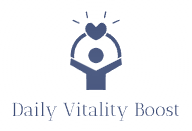
Unleash Your Inner Powerhouse: The Surprising Benefits of Vitamin B12
Are you feeling tired, sluggish, or a bit “blah” lately? Before you reach for another cup of coffee, could the answer be simpler than you think? It might be time to take a closer look at your Vitamin B12 levels.
At Daily Vitality Boost, we’re all about empowering you with the knowledge to live your best, most energetic life. And one often-overlooked key to that vitality is Vitamin B12. Let’s dive into why this nutrient is so crucial and how it can help you unleash your inner powerhouse.
What is Vitamin B12 and Why Do We Need It?
Vitamin B12, also known as cobalamin, is an essential water-soluble vitamin. This means our bodies can’t produce it, so we need to obtain it from our diet or supplements. It plays a vital role in numerous bodily functions, including:
- Nerve Function: B12 helps maintain the health of the myelin sheath, a protective covering around your nerves. Without enough B12, this sheath can become damaged, leading to nerve problems.
- DNA Synthesis: B12 is crucial for creating DNA, the genetic blueprint of every cell in your body.
- Red Blood Cell Formation: It helps produce healthy red blood cells, which carry oxygen throughout your body. A deficiency can lead to a type of anemia called megaloblastic anemia.
- Brain Health: Studies suggest B12 plays a role in cognitive function and may help protect against age-related cognitive decline.
The Amazing Benefits of Vitamin B12
Now, let’s explore the amazing benefits you can experience when your B12 levels are optimal:
- Boosted Energy Levels: Feeling constantly fatigued? B12 can help! By supporting red blood cell production and oxygen transport, it combats fatigue and increases energy levels. Many people report a noticeable difference in their energy after addressing a B12 deficiency.
- Improved Mood: B12 is involved in the production of neurotransmitters like serotonin and dopamine, which regulate mood. Some studies suggest a link between B12 deficiency and depression. While B12 isn’t a cure for mood disorders, ensuring adequate levels can contribute to overall well-being.
- Enhanced Cognitive Function: B12 supports healthy brain function and may improve memory and concentration. As we age, maintaining healthy B12 levels becomes even more critical for cognitive health.
- Stronger Bones: Research indicates that B12 may play a role in bone health. Some studies have linked low B12 levels to an increased risk of osteoporosis, especially in women.
- Heart Health Support: B12 helps regulate homocysteine levels in the blood. High levels of homocysteine are linked to an increased risk of heart disease.
Are You at Risk for a B12 Deficiency?
While B12 is vital for everyone, certain groups are at higher risk of deficiency:
- Vegans and Vegetarians: B12 is primarily found in animal products, so those following plant-based diets are at higher risk.
- Older Adults: As we age, our ability to absorb B12 from food decreases.
- People with Digestive Disorders: Conditions like Crohn’s disease, celiac disease, and atrophic gastritis can impair B12 absorption.
- Those Taking Certain Medications: Some medications, such as proton pump inhibitors (PPIs) for heartburn, can interfere with B12 absorption.
How to Get Enough Vitamin B12
Here are some ways to ensure you’re getting enough Vitamin B12:
- Dietary Sources: Include B12-rich foods in your diet, such as meat, poultry, fish, eggs, and dairy products.
- Fortified Foods: Many foods are fortified with B12, including breakfast cereals, plant-based milk alternatives, and nutritional yeast. Check the labels to see if your favorite foods are fortified.
- Supplements: B12 supplements are widely available in various forms, including tablets, capsules, sublingual lozenges, and injections. If you suspect you’re deficient or fall into a high-risk category, talk to your doctor about whether supplementation is right for you.
Symptoms of B12 Deficiency
It’s important to be aware of the symptoms of B12 deficiency. Common symptoms include:
- Fatigue
- Weakness
- Pale skin
- Numbness or tingling in the hands and feet
- Difficulty walking
- Memory problems
- Mouth sores or a swollen tongue
If you experience any of these symptoms, consult your doctor. They can perform a blood test to check your B12 levels and recommend appropriate treatment.
Takeaway
Vitamin B12 is a powerhouse nutrient that plays a crucial role in your overall health and well-being. By ensuring you get enough B12 through diet, fortified foods, or supplements, you can unlock a wealth of benefits, from boosted energy to improved mood and enhanced cognitive function.
- What are your favorite ways to get B12? Share your tips in the comments below!
- Do you have any personal experiences with B12 deficiency or supplementation? We’d love to hear your story!
- Share this article with your friends and family who might benefit from learning about the importance of Vitamin B12!
Disclaimer: This article is for informational purposes only and does not constitute medical advice. Please consult with a healthcare professional before making any changes to your diet or supplement regimen.
Next






Comments are closed